Deloitte Australia: IFRS Adoption and Its Impact on Accounting Quality
VerifiedAdded on 2021/02/19
|16
|5411
|48
Report
AI Summary
This report examines the impact of International Financial Reporting Standards (IFRS) adoption on accounting quality, focusing on a study of Deloitte Australia. The research investigates the positive and negative impacts of IFRS adoption, including improved comparability and challenges related to implementation. The literature review explores themes such as the effects on organizations, the impact on accounting quality, and the challenges faced by companies during IFRS adoption. The study also outlines the research design, methodology, and ethical considerations. The report highlights the importance of IFRS adoption and its implications for financial reporting, while also discussing the challenges and strategies for improvement. The report aims to offer a comprehensive understanding of the influence of IFRS on accounting practices and the overall quality of financial information.
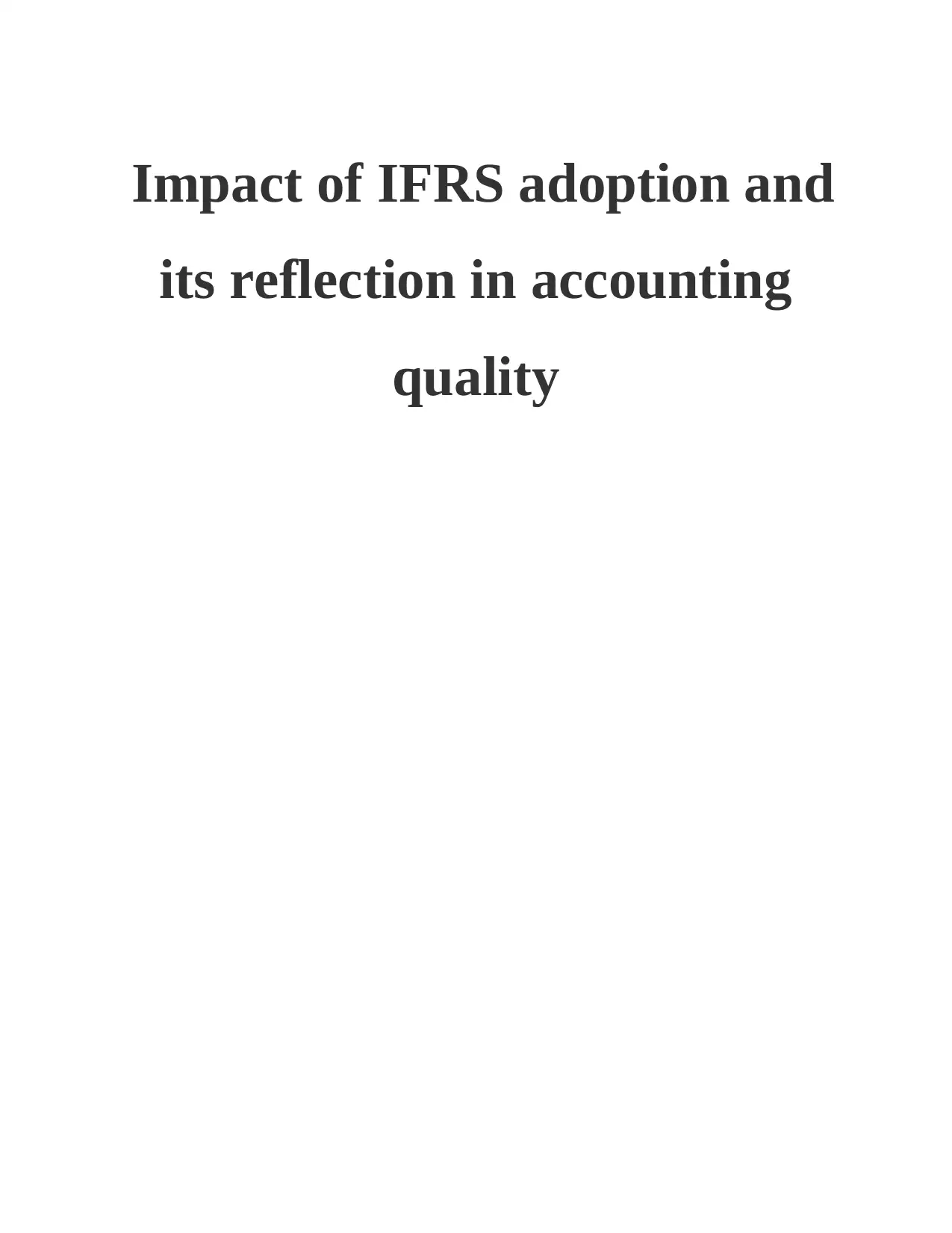
Impact of IFRS adoption and
its reflection in accounting
quality
its reflection in accounting
quality
Paraphrase This Document
Need a fresh take? Get an instant paraphrase of this document with our AI Paraphraser
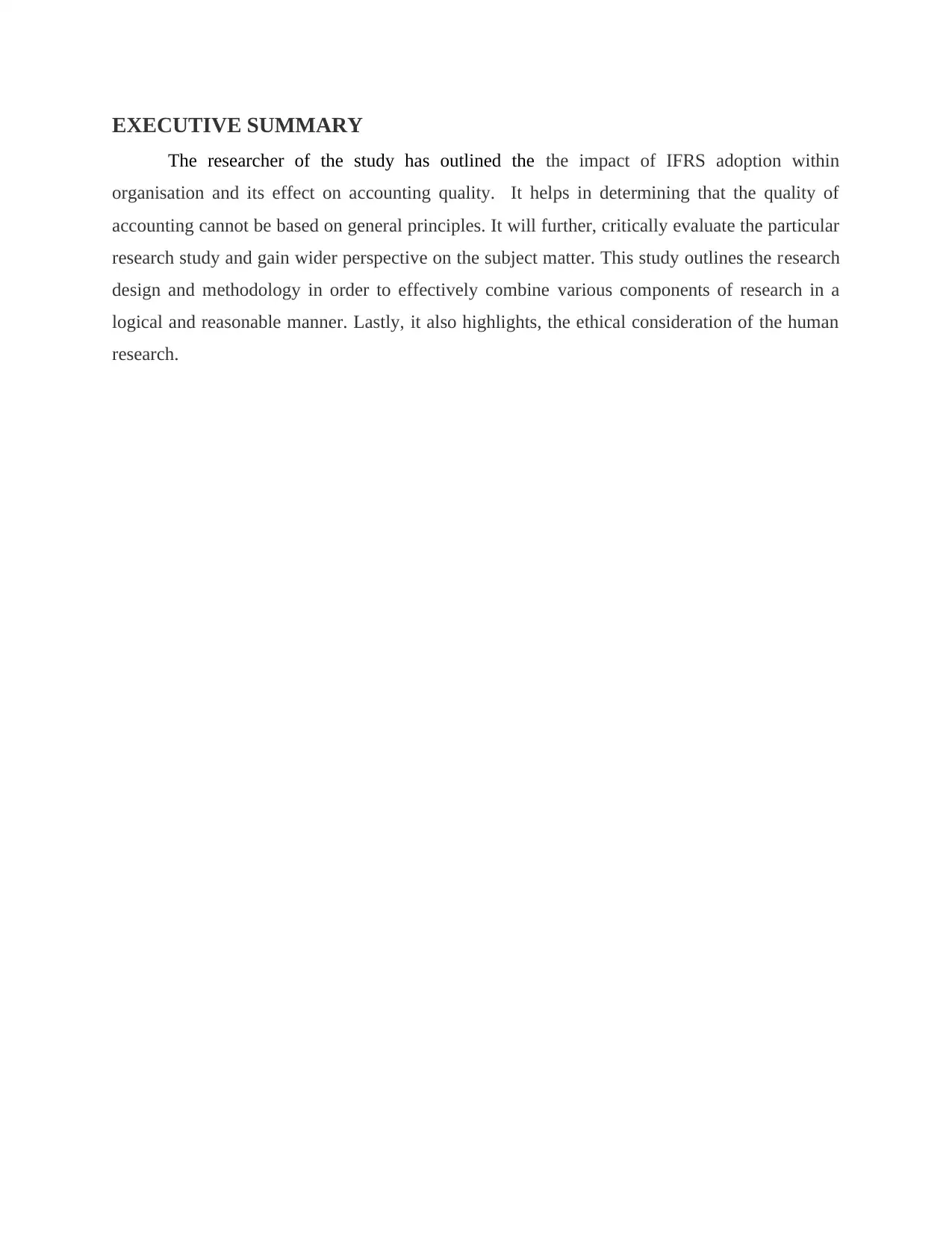
EXECUTIVE SUMMARY
The researcher of the study has outlined the the impact of IFRS adoption within
organisation and its effect on accounting quality. It helps in determining that the quality of
accounting cannot be based on general principles. It will further, critically evaluate the particular
research study and gain wider perspective on the subject matter. This study outlines the research
design and methodology in order to effectively combine various components of research in a
logical and reasonable manner. Lastly, it also highlights, the ethical consideration of the human
research.
The researcher of the study has outlined the the impact of IFRS adoption within
organisation and its effect on accounting quality. It helps in determining that the quality of
accounting cannot be based on general principles. It will further, critically evaluate the particular
research study and gain wider perspective on the subject matter. This study outlines the research
design and methodology in order to effectively combine various components of research in a
logical and reasonable manner. Lastly, it also highlights, the ethical consideration of the human
research.
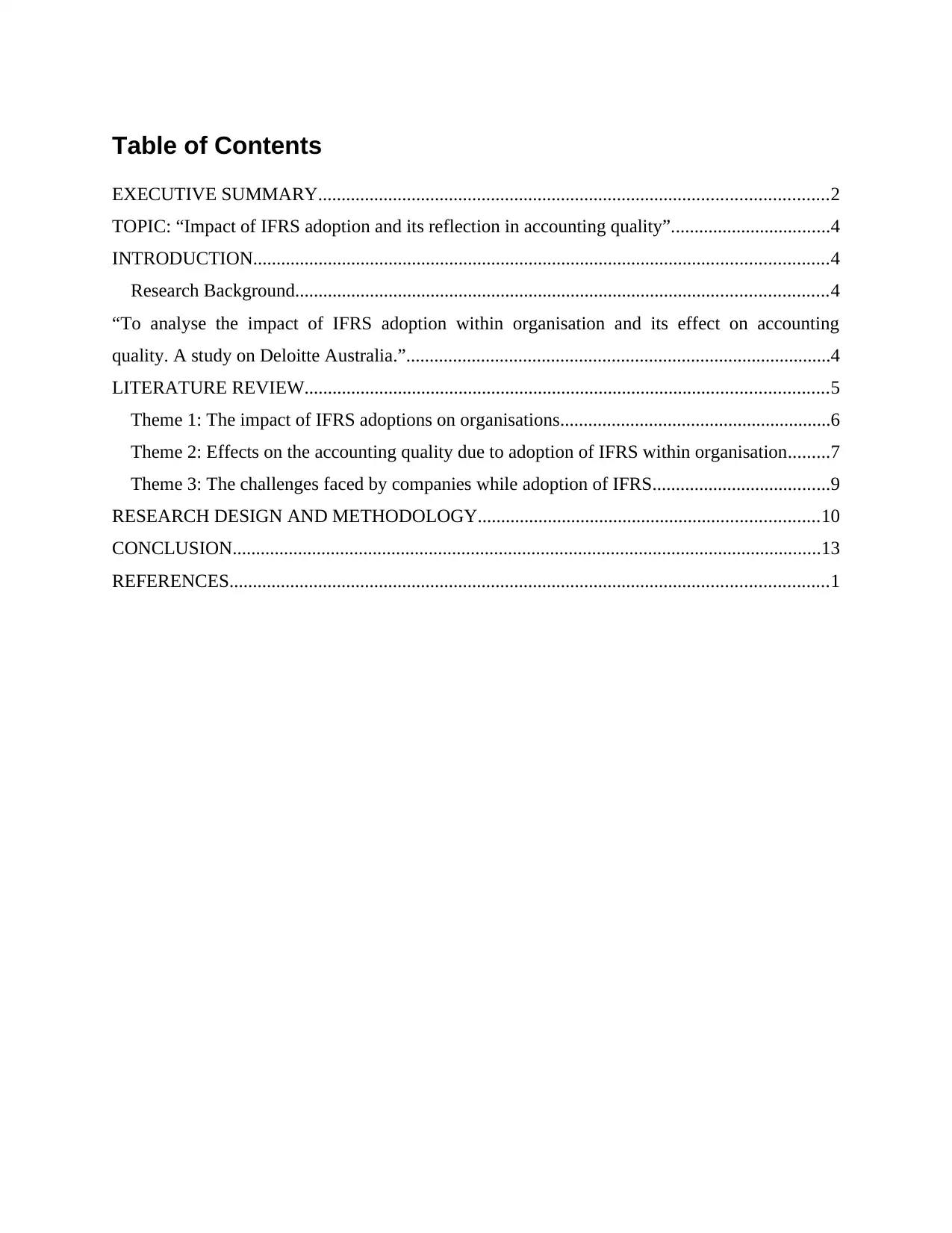
Table of Contents
EXECUTIVE SUMMARY.............................................................................................................2
TOPIC: “Impact of IFRS adoption and its reflection in accounting quality”..................................4
INTRODUCTION...........................................................................................................................4
Research Background..................................................................................................................4
“To analyse the impact of IFRS adoption within organisation and its effect on accounting
quality. A study on Deloitte Australia.”...........................................................................................4
LITERATURE REVIEW................................................................................................................5
Theme 1: The impact of IFRS adoptions on organisations..........................................................6
Theme 2: Effects on the accounting quality due to adoption of IFRS within organisation.........7
Theme 3: The challenges faced by companies while adoption of IFRS......................................9
RESEARCH DESIGN AND METHODOLOGY.........................................................................10
CONCLUSION..............................................................................................................................13
REFERENCES................................................................................................................................1
EXECUTIVE SUMMARY.............................................................................................................2
TOPIC: “Impact of IFRS adoption and its reflection in accounting quality”..................................4
INTRODUCTION...........................................................................................................................4
Research Background..................................................................................................................4
“To analyse the impact of IFRS adoption within organisation and its effect on accounting
quality. A study on Deloitte Australia.”...........................................................................................4
LITERATURE REVIEW................................................................................................................5
Theme 1: The impact of IFRS adoptions on organisations..........................................................6
Theme 2: Effects on the accounting quality due to adoption of IFRS within organisation.........7
Theme 3: The challenges faced by companies while adoption of IFRS......................................9
RESEARCH DESIGN AND METHODOLOGY.........................................................................10
CONCLUSION..............................................................................................................................13
REFERENCES................................................................................................................................1
⊘ This is a preview!⊘
Do you want full access?
Subscribe today to unlock all pages.

Trusted by 1+ million students worldwide
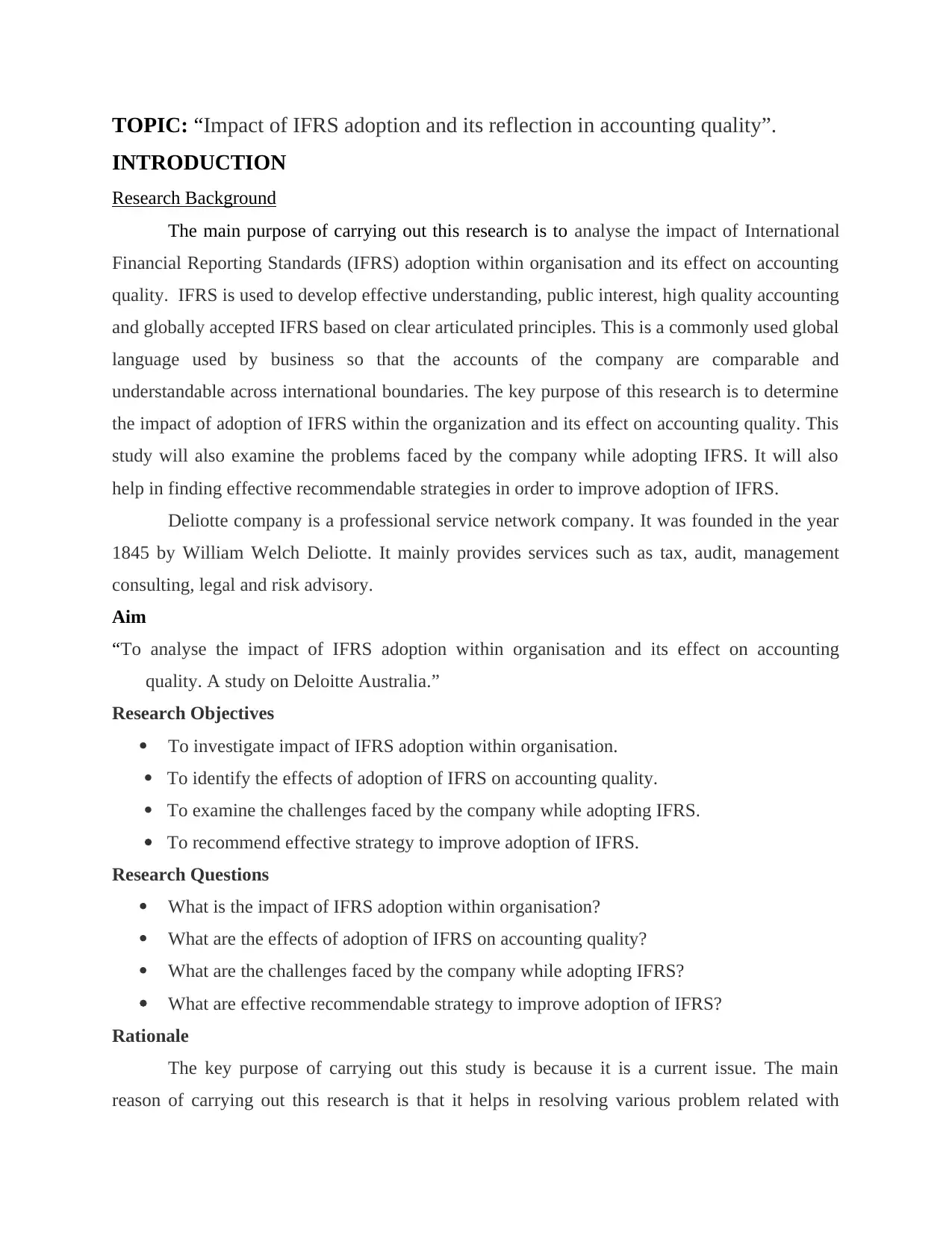
TOPIC: “Impact of IFRS adoption and its reflection in accounting quality”.
INTRODUCTION
Research Background
The main purpose of carrying out this research is to analyse the impact of International
Financial Reporting Standards (IFRS) adoption within organisation and its effect on accounting
quality. IFRS is used to develop effective understanding, public interest, high quality accounting
and globally accepted IFRS based on clear articulated principles. This is a commonly used global
language used by business so that the accounts of the company are comparable and
understandable across international boundaries. The key purpose of this research is to determine
the impact of adoption of IFRS within the organization and its effect on accounting quality. This
study will also examine the problems faced by the company while adopting IFRS. It will also
help in finding effective recommendable strategies in order to improve adoption of IFRS.
Deliotte company is a professional service network company. It was founded in the year
1845 by William Welch Deliotte. It mainly provides services such as tax, audit, management
consulting, legal and risk advisory.
Aim
“To analyse the impact of IFRS adoption within organisation and its effect on accounting
quality. A study on Deloitte Australia.”
Research Objectives
To investigate impact of IFRS adoption within organisation.
To identify the effects of adoption of IFRS on accounting quality.
To examine the challenges faced by the company while adopting IFRS.
To recommend effective strategy to improve adoption of IFRS.
Research Questions
What is the impact of IFRS adoption within organisation?
What are the effects of adoption of IFRS on accounting quality?
What are the challenges faced by the company while adopting IFRS?
What are effective recommendable strategy to improve adoption of IFRS?
Rationale
The key purpose of carrying out this study is because it is a current issue. The main
reason of carrying out this research is that it helps in resolving various problem related with
INTRODUCTION
Research Background
The main purpose of carrying out this research is to analyse the impact of International
Financial Reporting Standards (IFRS) adoption within organisation and its effect on accounting
quality. IFRS is used to develop effective understanding, public interest, high quality accounting
and globally accepted IFRS based on clear articulated principles. This is a commonly used global
language used by business so that the accounts of the company are comparable and
understandable across international boundaries. The key purpose of this research is to determine
the impact of adoption of IFRS within the organization and its effect on accounting quality. This
study will also examine the problems faced by the company while adopting IFRS. It will also
help in finding effective recommendable strategies in order to improve adoption of IFRS.
Deliotte company is a professional service network company. It was founded in the year
1845 by William Welch Deliotte. It mainly provides services such as tax, audit, management
consulting, legal and risk advisory.
Aim
“To analyse the impact of IFRS adoption within organisation and its effect on accounting
quality. A study on Deloitte Australia.”
Research Objectives
To investigate impact of IFRS adoption within organisation.
To identify the effects of adoption of IFRS on accounting quality.
To examine the challenges faced by the company while adopting IFRS.
To recommend effective strategy to improve adoption of IFRS.
Research Questions
What is the impact of IFRS adoption within organisation?
What are the effects of adoption of IFRS on accounting quality?
What are the challenges faced by the company while adopting IFRS?
What are effective recommendable strategy to improve adoption of IFRS?
Rationale
The key purpose of carrying out this study is because it is a current issue. The main
reason of carrying out this research is that it helps in resolving various problem related with
Paraphrase This Document
Need a fresh take? Get an instant paraphrase of this document with our AI Paraphraser
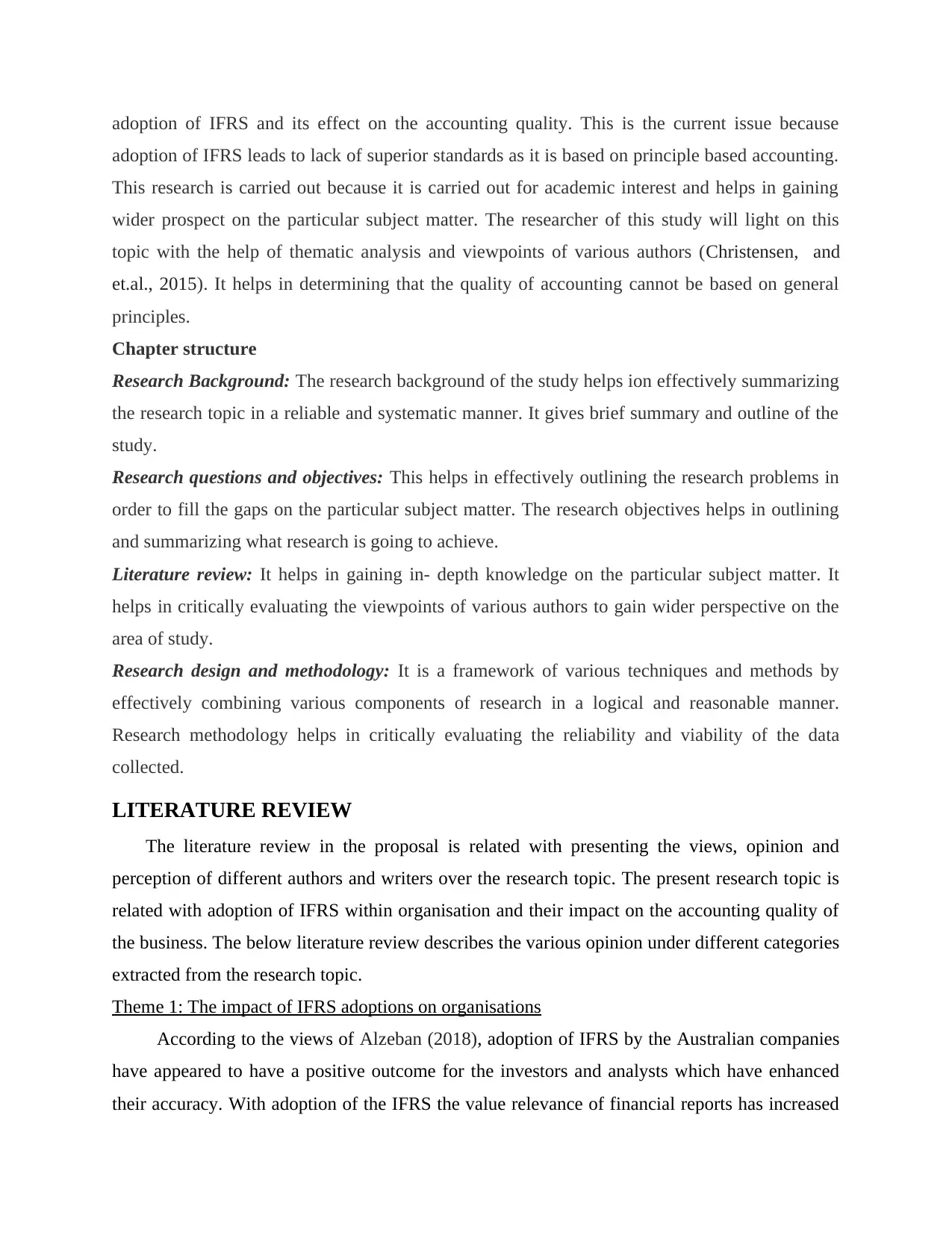
adoption of IFRS and its effect on the accounting quality. This is the current issue because
adoption of IFRS leads to lack of superior standards as it is based on principle based accounting.
This research is carried out because it is carried out for academic interest and helps in gaining
wider prospect on the particular subject matter. The researcher of this study will light on this
topic with the help of thematic analysis and viewpoints of various authors (Christensen, and
et.al., 2015). It helps in determining that the quality of accounting cannot be based on general
principles.
Chapter structure
Research Background: The research background of the study helps ion effectively summarizing
the research topic in a reliable and systematic manner. It gives brief summary and outline of the
study.
Research questions and objectives: This helps in effectively outlining the research problems in
order to fill the gaps on the particular subject matter. The research objectives helps in outlining
and summarizing what research is going to achieve.
Literature review: It helps in gaining in- depth knowledge on the particular subject matter. It
helps in critically evaluating the viewpoints of various authors to gain wider perspective on the
area of study.
Research design and methodology: It is a framework of various techniques and methods by
effectively combining various components of research in a logical and reasonable manner.
Research methodology helps in critically evaluating the reliability and viability of the data
collected.
LITERATURE REVIEW
The literature review in the proposal is related with presenting the views, opinion and
perception of different authors and writers over the research topic. The present research topic is
related with adoption of IFRS within organisation and their impact on the accounting quality of
the business. The below literature review describes the various opinion under different categories
extracted from the research topic.
Theme 1: The impact of IFRS adoptions on organisations
According to the views of Alzeban (2018), adoption of IFRS by the Australian companies
have appeared to have a positive outcome for the investors and analysts which have enhanced
their accuracy. With adoption of the IFRS the value relevance of financial reports has increased
adoption of IFRS leads to lack of superior standards as it is based on principle based accounting.
This research is carried out because it is carried out for academic interest and helps in gaining
wider prospect on the particular subject matter. The researcher of this study will light on this
topic with the help of thematic analysis and viewpoints of various authors (Christensen, and
et.al., 2015). It helps in determining that the quality of accounting cannot be based on general
principles.
Chapter structure
Research Background: The research background of the study helps ion effectively summarizing
the research topic in a reliable and systematic manner. It gives brief summary and outline of the
study.
Research questions and objectives: This helps in effectively outlining the research problems in
order to fill the gaps on the particular subject matter. The research objectives helps in outlining
and summarizing what research is going to achieve.
Literature review: It helps in gaining in- depth knowledge on the particular subject matter. It
helps in critically evaluating the viewpoints of various authors to gain wider perspective on the
area of study.
Research design and methodology: It is a framework of various techniques and methods by
effectively combining various components of research in a logical and reasonable manner.
Research methodology helps in critically evaluating the reliability and viability of the data
collected.
LITERATURE REVIEW
The literature review in the proposal is related with presenting the views, opinion and
perception of different authors and writers over the research topic. The present research topic is
related with adoption of IFRS within organisation and their impact on the accounting quality of
the business. The below literature review describes the various opinion under different categories
extracted from the research topic.
Theme 1: The impact of IFRS adoptions on organisations
According to the views of Alzeban (2018), adoption of IFRS by the Australian companies
have appeared to have a positive outcome for the investors and analysts which have enhanced
their accuracy. With adoption of the IFRS the value relevance of financial reports has increased
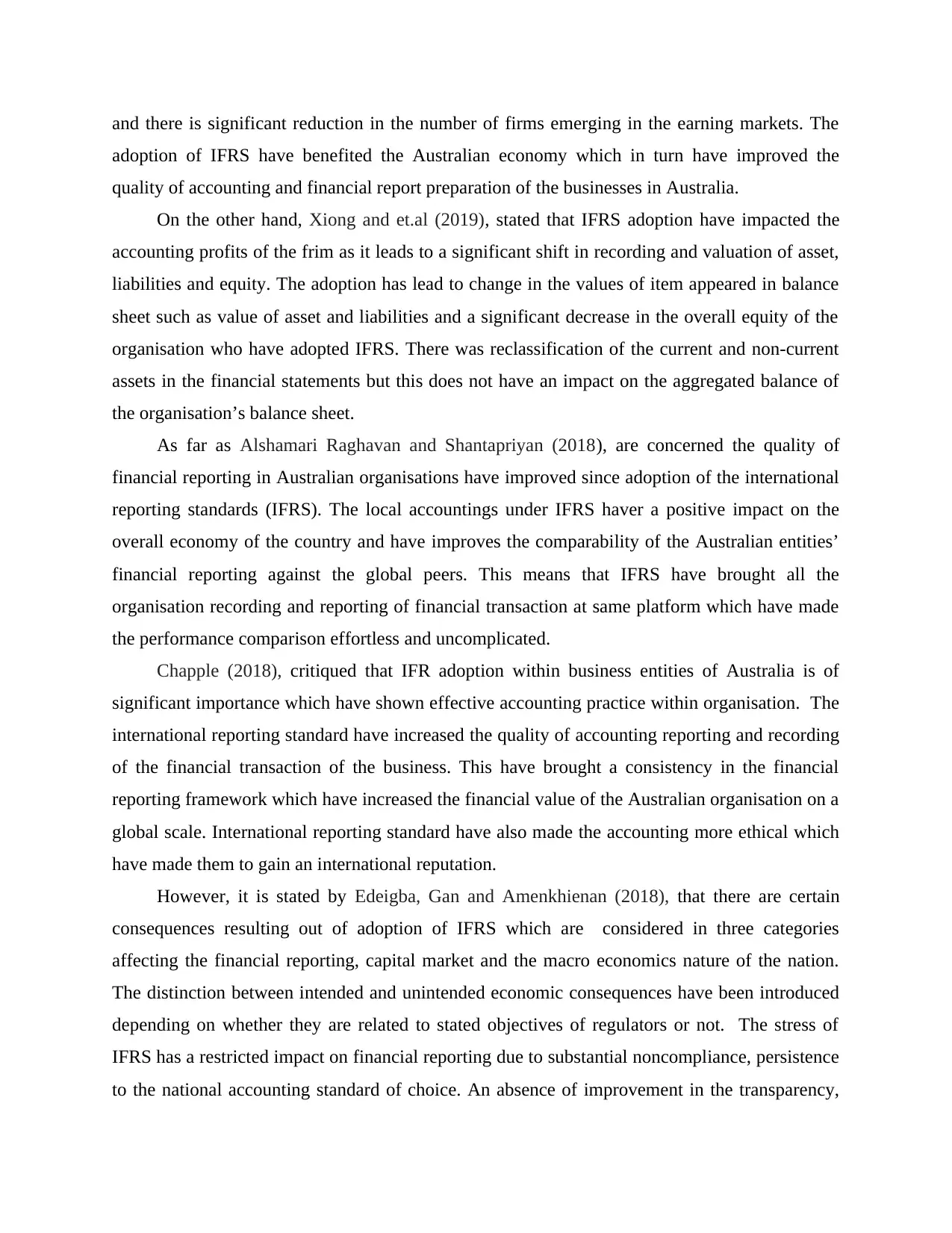
and there is significant reduction in the number of firms emerging in the earning markets. The
adoption of IFRS have benefited the Australian economy which in turn have improved the
quality of accounting and financial report preparation of the businesses in Australia.
On the other hand, Xiong and et.al (2019), stated that IFRS adoption have impacted the
accounting profits of the frim as it leads to a significant shift in recording and valuation of asset,
liabilities and equity. The adoption has lead to change in the values of item appeared in balance
sheet such as value of asset and liabilities and a significant decrease in the overall equity of the
organisation who have adopted IFRS. There was reclassification of the current and non-current
assets in the financial statements but this does not have an impact on the aggregated balance of
the organisation’s balance sheet.
As far as Alshamari Raghavan and Shantapriyan (2018), are concerned the quality of
financial reporting in Australian organisations have improved since adoption of the international
reporting standards (IFRS). The local accountings under IFRS haver a positive impact on the
overall economy of the country and have improves the comparability of the Australian entities’
financial reporting against the global peers. This means that IFRS have brought all the
organisation recording and reporting of financial transaction at same platform which have made
the performance comparison effortless and uncomplicated.
Chapple (2018), critiqued that IFR adoption within business entities of Australia is of
significant importance which have shown effective accounting practice within organisation. The
international reporting standard have increased the quality of accounting reporting and recording
of the financial transaction of the business. This have brought a consistency in the financial
reporting framework which have increased the financial value of the Australian organisation on a
global scale. International reporting standard have also made the accounting more ethical which
have made them to gain an international reputation.
However, it is stated by Edeigba, Gan and Amenkhienan (2018), that there are certain
consequences resulting out of adoption of IFRS which are considered in three categories
affecting the financial reporting, capital market and the macro economics nature of the nation.
The distinction between intended and unintended economic consequences have been introduced
depending on whether they are related to stated objectives of regulators or not. The stress of
IFRS has a restricted impact on financial reporting due to substantial noncompliance, persistence
to the national accounting standard of choice. An absence of improvement in the transparency,
adoption of IFRS have benefited the Australian economy which in turn have improved the
quality of accounting and financial report preparation of the businesses in Australia.
On the other hand, Xiong and et.al (2019), stated that IFRS adoption have impacted the
accounting profits of the frim as it leads to a significant shift in recording and valuation of asset,
liabilities and equity. The adoption has lead to change in the values of item appeared in balance
sheet such as value of asset and liabilities and a significant decrease in the overall equity of the
organisation who have adopted IFRS. There was reclassification of the current and non-current
assets in the financial statements but this does not have an impact on the aggregated balance of
the organisation’s balance sheet.
As far as Alshamari Raghavan and Shantapriyan (2018), are concerned the quality of
financial reporting in Australian organisations have improved since adoption of the international
reporting standards (IFRS). The local accountings under IFRS haver a positive impact on the
overall economy of the country and have improves the comparability of the Australian entities’
financial reporting against the global peers. This means that IFRS have brought all the
organisation recording and reporting of financial transaction at same platform which have made
the performance comparison effortless and uncomplicated.
Chapple (2018), critiqued that IFR adoption within business entities of Australia is of
significant importance which have shown effective accounting practice within organisation. The
international reporting standard have increased the quality of accounting reporting and recording
of the financial transaction of the business. This have brought a consistency in the financial
reporting framework which have increased the financial value of the Australian organisation on a
global scale. International reporting standard have also made the accounting more ethical which
have made them to gain an international reputation.
However, it is stated by Edeigba, Gan and Amenkhienan (2018), that there are certain
consequences resulting out of adoption of IFRS which are considered in three categories
affecting the financial reporting, capital market and the macro economics nature of the nation.
The distinction between intended and unintended economic consequences have been introduced
depending on whether they are related to stated objectives of regulators or not. The stress of
IFRS has a restricted impact on financial reporting due to substantial noncompliance, persistence
to the national accounting standard of choice. An absence of improvement in the transparency,
⊘ This is a preview!⊘
Do you want full access?
Subscribe today to unlock all pages.

Trusted by 1+ million students worldwide
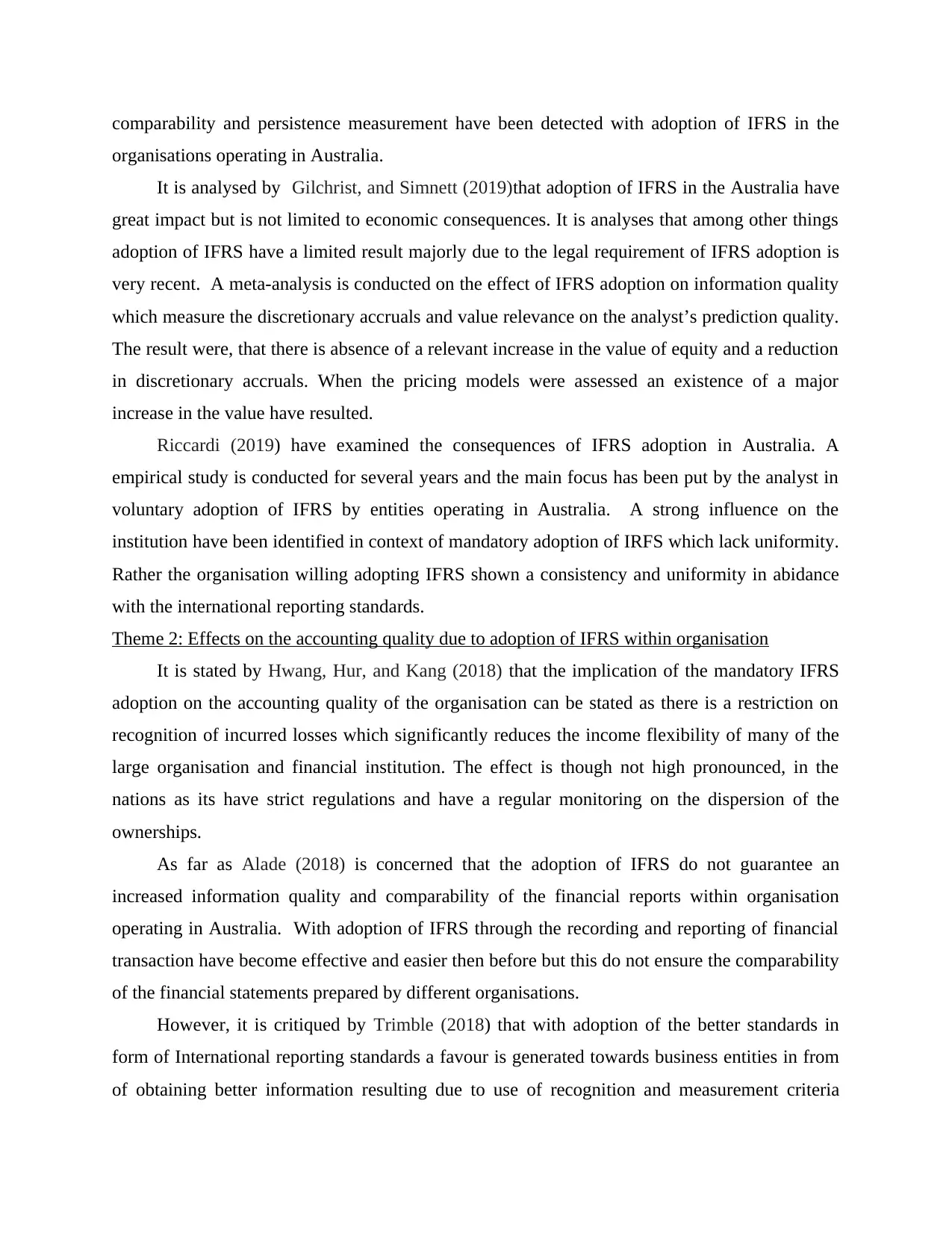
comparability and persistence measurement have been detected with adoption of IFRS in the
organisations operating in Australia.
It is analysed by Gilchrist, and Simnett (2019)that adoption of IFRS in the Australia have
great impact but is not limited to economic consequences. It is analyses that among other things
adoption of IFRS have a limited result majorly due to the legal requirement of IFRS adoption is
very recent. A meta-analysis is conducted on the effect of IFRS adoption on information quality
which measure the discretionary accruals and value relevance on the analyst’s prediction quality.
The result were, that there is absence of a relevant increase in the value of equity and a reduction
in discretionary accruals. When the pricing models were assessed an existence of a major
increase in the value have resulted.
Riccardi (2019) have examined the consequences of IFRS adoption in Australia. A
empirical study is conducted for several years and the main focus has been put by the analyst in
voluntary adoption of IFRS by entities operating in Australia. A strong influence on the
institution have been identified in context of mandatory adoption of IRFS which lack uniformity.
Rather the organisation willing adopting IFRS shown a consistency and uniformity in abidance
with the international reporting standards.
Theme 2: Effects on the accounting quality due to adoption of IFRS within organisation
It is stated by Hwang, Hur, and Kang (2018) that the implication of the mandatory IFRS
adoption on the accounting quality of the organisation can be stated as there is a restriction on
recognition of incurred losses which significantly reduces the income flexibility of many of the
large organisation and financial institution. The effect is though not high pronounced, in the
nations as its have strict regulations and have a regular monitoring on the dispersion of the
ownerships.
As far as Alade (2018) is concerned that the adoption of IFRS do not guarantee an
increased information quality and comparability of the financial reports within organisation
operating in Australia. With adoption of IFRS through the recording and reporting of financial
transaction have become effective and easier then before but this do not ensure the comparability
of the financial statements prepared by different organisations.
However, it is critiqued by Trimble (2018) that with adoption of the better standards in
form of International reporting standards a favour is generated towards business entities in from
of obtaining better information resulting due to use of recognition and measurement criteria
organisations operating in Australia.
It is analysed by Gilchrist, and Simnett (2019)that adoption of IFRS in the Australia have
great impact but is not limited to economic consequences. It is analyses that among other things
adoption of IFRS have a limited result majorly due to the legal requirement of IFRS adoption is
very recent. A meta-analysis is conducted on the effect of IFRS adoption on information quality
which measure the discretionary accruals and value relevance on the analyst’s prediction quality.
The result were, that there is absence of a relevant increase in the value of equity and a reduction
in discretionary accruals. When the pricing models were assessed an existence of a major
increase in the value have resulted.
Riccardi (2019) have examined the consequences of IFRS adoption in Australia. A
empirical study is conducted for several years and the main focus has been put by the analyst in
voluntary adoption of IFRS by entities operating in Australia. A strong influence on the
institution have been identified in context of mandatory adoption of IRFS which lack uniformity.
Rather the organisation willing adopting IFRS shown a consistency and uniformity in abidance
with the international reporting standards.
Theme 2: Effects on the accounting quality due to adoption of IFRS within organisation
It is stated by Hwang, Hur, and Kang (2018) that the implication of the mandatory IFRS
adoption on the accounting quality of the organisation can be stated as there is a restriction on
recognition of incurred losses which significantly reduces the income flexibility of many of the
large organisation and financial institution. The effect is though not high pronounced, in the
nations as its have strict regulations and have a regular monitoring on the dispersion of the
ownerships.
As far as Alade (2018) is concerned that the adoption of IFRS do not guarantee an
increased information quality and comparability of the financial reports within organisation
operating in Australia. With adoption of IFRS through the recording and reporting of financial
transaction have become effective and easier then before but this do not ensure the comparability
of the financial statements prepared by different organisations.
However, it is critiqued by Trimble (2018) that with adoption of the better standards in
form of International reporting standards a favour is generated towards business entities in from
of obtaining better information resulting due to use of recognition and measurement criteria
Paraphrase This Document
Need a fresh take? Get an instant paraphrase of this document with our AI Paraphraser
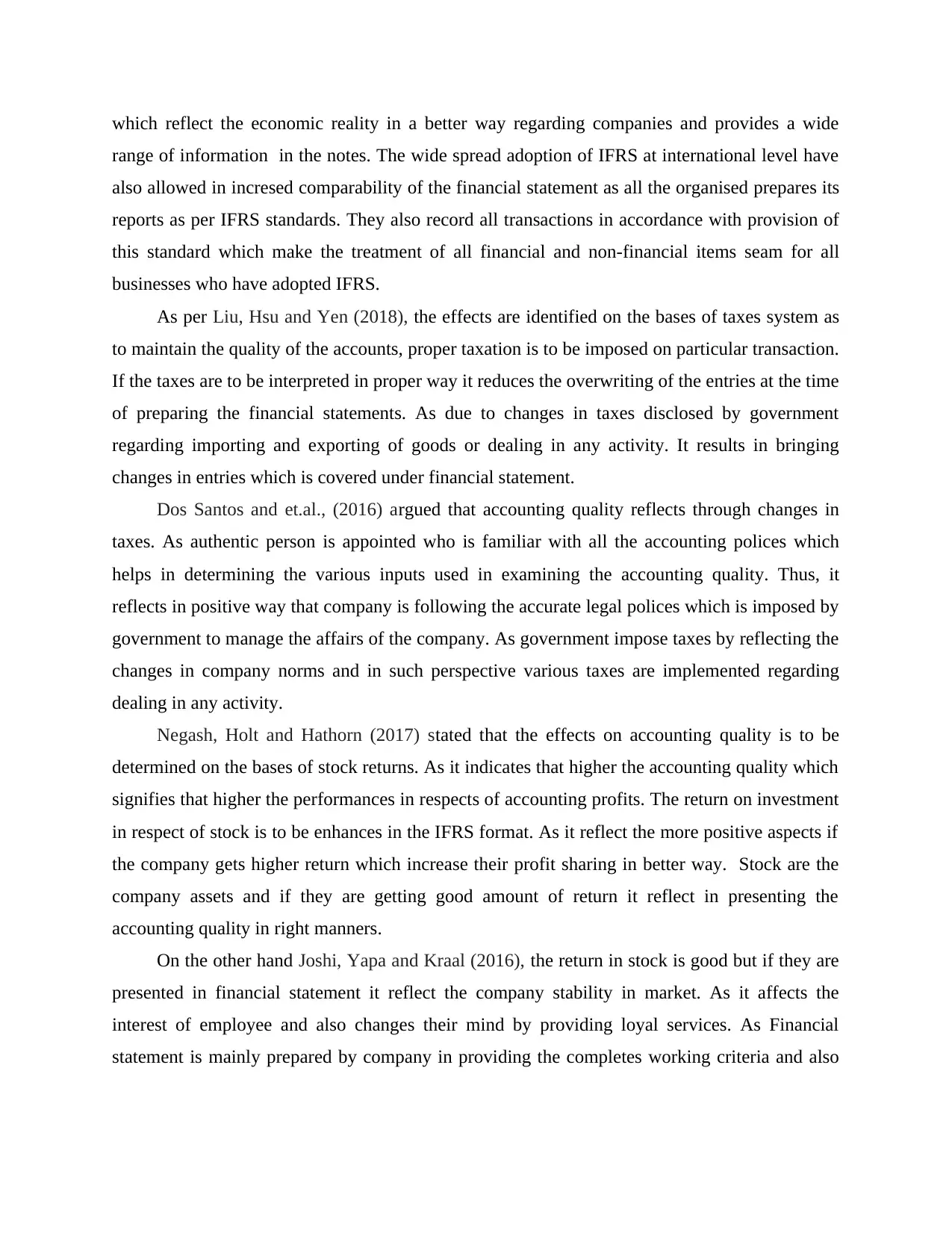
which reflect the economic reality in a better way regarding companies and provides a wide
range of information in the notes. The wide spread adoption of IFRS at international level have
also allowed in incresed comparability of the financial statement as all the organised prepares its
reports as per IFRS standards. They also record all transactions in accordance with provision of
this standard which make the treatment of all financial and non-financial items seam for all
businesses who have adopted IFRS.
As per Liu, Hsu and Yen (2018), the effects are identified on the bases of taxes system as
to maintain the quality of the accounts, proper taxation is to be imposed on particular transaction.
If the taxes are to be interpreted in proper way it reduces the overwriting of the entries at the time
of preparing the financial statements. As due to changes in taxes disclosed by government
regarding importing and exporting of goods or dealing in any activity. It results in bringing
changes in entries which is covered under financial statement.
Dos Santos and et.al., (2016) argued that accounting quality reflects through changes in
taxes. As authentic person is appointed who is familiar with all the accounting polices which
helps in determining the various inputs used in examining the accounting quality. Thus, it
reflects in positive way that company is following the accurate legal polices which is imposed by
government to manage the affairs of the company. As government impose taxes by reflecting the
changes in company norms and in such perspective various taxes are implemented regarding
dealing in any activity.
Negash, Holt and Hathorn (2017) stated that the effects on accounting quality is to be
determined on the bases of stock returns. As it indicates that higher the accounting quality which
signifies that higher the performances in respects of accounting profits. The return on investment
in respect of stock is to be enhances in the IFRS format. As it reflect the more positive aspects if
the company gets higher return which increase their profit sharing in better way. Stock are the
company assets and if they are getting good amount of return it reflect in presenting the
accounting quality in right manners.
On the other hand Joshi, Yapa and Kraal (2016), the return in stock is good but if they are
presented in financial statement it reflect the company stability in market. As it affects the
interest of employee and also changes their mind by providing loyal services. As Financial
statement is mainly prepared by company in providing the completes working criteria and also
range of information in the notes. The wide spread adoption of IFRS at international level have
also allowed in incresed comparability of the financial statement as all the organised prepares its
reports as per IFRS standards. They also record all transactions in accordance with provision of
this standard which make the treatment of all financial and non-financial items seam for all
businesses who have adopted IFRS.
As per Liu, Hsu and Yen (2018), the effects are identified on the bases of taxes system as
to maintain the quality of the accounts, proper taxation is to be imposed on particular transaction.
If the taxes are to be interpreted in proper way it reduces the overwriting of the entries at the time
of preparing the financial statements. As due to changes in taxes disclosed by government
regarding importing and exporting of goods or dealing in any activity. It results in bringing
changes in entries which is covered under financial statement.
Dos Santos and et.al., (2016) argued that accounting quality reflects through changes in
taxes. As authentic person is appointed who is familiar with all the accounting polices which
helps in determining the various inputs used in examining the accounting quality. Thus, it
reflects in positive way that company is following the accurate legal polices which is imposed by
government to manage the affairs of the company. As government impose taxes by reflecting the
changes in company norms and in such perspective various taxes are implemented regarding
dealing in any activity.
Negash, Holt and Hathorn (2017) stated that the effects on accounting quality is to be
determined on the bases of stock returns. As it indicates that higher the accounting quality which
signifies that higher the performances in respects of accounting profits. The return on investment
in respect of stock is to be enhances in the IFRS format. As it reflect the more positive aspects if
the company gets higher return which increase their profit sharing in better way. Stock are the
company assets and if they are getting good amount of return it reflect in presenting the
accounting quality in right manners.
On the other hand Joshi, Yapa and Kraal (2016), the return in stock is good but if they are
presented in financial statement it reflect the company stability in market. As it affects the
interest of employee and also changes their mind by providing loyal services. As Financial
statement is mainly prepared by company in providing the completes working criteria and also
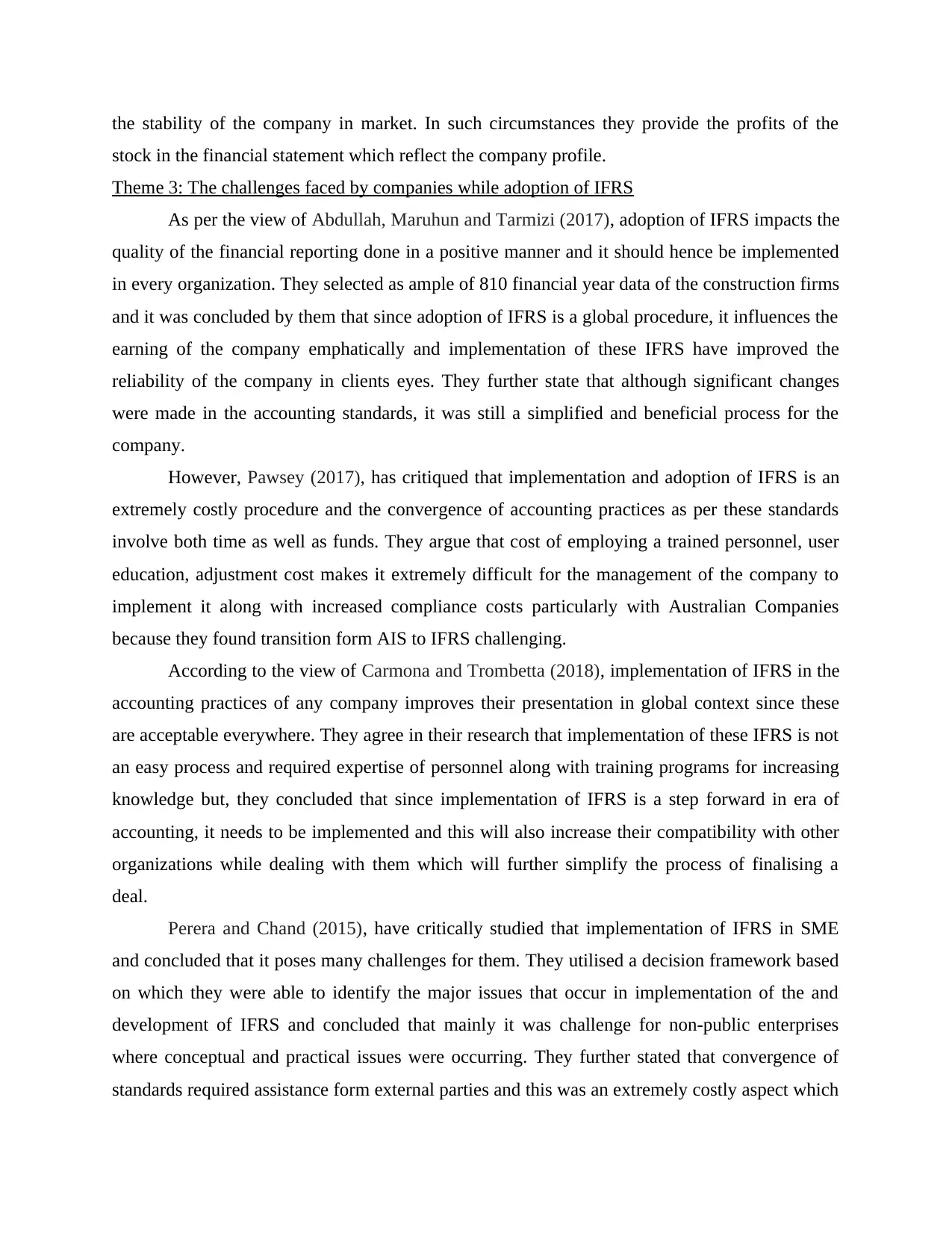
the stability of the company in market. In such circumstances they provide the profits of the
stock in the financial statement which reflect the company profile.
Theme 3: The challenges faced by companies while adoption of IFRS
As per the view of Abdullah, Maruhun and Tarmizi (2017), adoption of IFRS impacts the
quality of the financial reporting done in a positive manner and it should hence be implemented
in every organization. They selected as ample of 810 financial year data of the construction firms
and it was concluded by them that since adoption of IFRS is a global procedure, it influences the
earning of the company emphatically and implementation of these IFRS have improved the
reliability of the company in clients eyes. They further state that although significant changes
were made in the accounting standards, it was still a simplified and beneficial process for the
company.
However, Pawsey (2017), has critiqued that implementation and adoption of IFRS is an
extremely costly procedure and the convergence of accounting practices as per these standards
involve both time as well as funds. They argue that cost of employing a trained personnel, user
education, adjustment cost makes it extremely difficult for the management of the company to
implement it along with increased compliance costs particularly with Australian Companies
because they found transition form AIS to IFRS challenging.
According to the view of Carmona and Trombetta (2018), implementation of IFRS in the
accounting practices of any company improves their presentation in global context since these
are acceptable everywhere. They agree in their research that implementation of these IFRS is not
an easy process and required expertise of personnel along with training programs for increasing
knowledge but, they concluded that since implementation of IFRS is a step forward in era of
accounting, it needs to be implemented and this will also increase their compatibility with other
organizations while dealing with them which will further simplify the process of finalising a
deal.
Perera and Chand (2015), have critically studied that implementation of IFRS in SME
and concluded that it poses many challenges for them. They utilised a decision framework based
on which they were able to identify the major issues that occur in implementation of the and
development of IFRS and concluded that mainly it was challenge for non-public enterprises
where conceptual and practical issues were occurring. They further stated that convergence of
standards required assistance form external parties and this was an extremely costly aspect which
stock in the financial statement which reflect the company profile.
Theme 3: The challenges faced by companies while adoption of IFRS
As per the view of Abdullah, Maruhun and Tarmizi (2017), adoption of IFRS impacts the
quality of the financial reporting done in a positive manner and it should hence be implemented
in every organization. They selected as ample of 810 financial year data of the construction firms
and it was concluded by them that since adoption of IFRS is a global procedure, it influences the
earning of the company emphatically and implementation of these IFRS have improved the
reliability of the company in clients eyes. They further state that although significant changes
were made in the accounting standards, it was still a simplified and beneficial process for the
company.
However, Pawsey (2017), has critiqued that implementation and adoption of IFRS is an
extremely costly procedure and the convergence of accounting practices as per these standards
involve both time as well as funds. They argue that cost of employing a trained personnel, user
education, adjustment cost makes it extremely difficult for the management of the company to
implement it along with increased compliance costs particularly with Australian Companies
because they found transition form AIS to IFRS challenging.
According to the view of Carmona and Trombetta (2018), implementation of IFRS in the
accounting practices of any company improves their presentation in global context since these
are acceptable everywhere. They agree in their research that implementation of these IFRS is not
an easy process and required expertise of personnel along with training programs for increasing
knowledge but, they concluded that since implementation of IFRS is a step forward in era of
accounting, it needs to be implemented and this will also increase their compatibility with other
organizations while dealing with them which will further simplify the process of finalising a
deal.
Perera and Chand (2015), have critically studied that implementation of IFRS in SME
and concluded that it poses many challenges for them. They utilised a decision framework based
on which they were able to identify the major issues that occur in implementation of the and
development of IFRS and concluded that mainly it was challenge for non-public enterprises
where conceptual and practical issues were occurring. They further stated that convergence of
standards required assistance form external parties and this was an extremely costly aspect which
⊘ This is a preview!⊘
Do you want full access?
Subscribe today to unlock all pages.

Trusted by 1+ million students worldwide
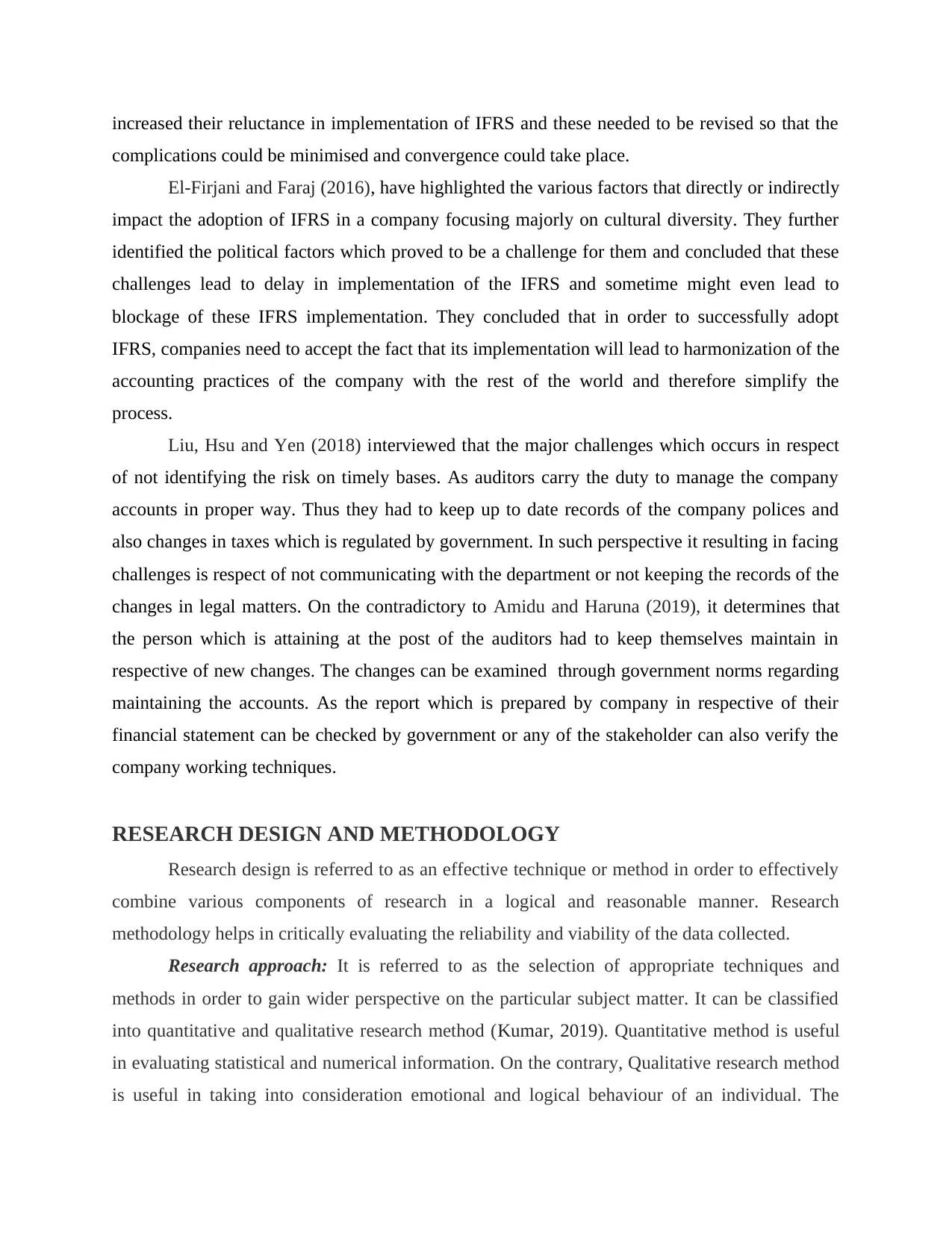
increased their reluctance in implementation of IFRS and these needed to be revised so that the
complications could be minimised and convergence could take place.
El-Firjani and Faraj (2016), have highlighted the various factors that directly or indirectly
impact the adoption of IFRS in a company focusing majorly on cultural diversity. They further
identified the political factors which proved to be a challenge for them and concluded that these
challenges lead to delay in implementation of the IFRS and sometime might even lead to
blockage of these IFRS implementation. They concluded that in order to successfully adopt
IFRS, companies need to accept the fact that its implementation will lead to harmonization of the
accounting practices of the company with the rest of the world and therefore simplify the
process.
Liu, Hsu and Yen (2018) interviewed that the major challenges which occurs in respect
of not identifying the risk on timely bases. As auditors carry the duty to manage the company
accounts in proper way. Thus they had to keep up to date records of the company polices and
also changes in taxes which is regulated by government. In such perspective it resulting in facing
challenges is respect of not communicating with the department or not keeping the records of the
changes in legal matters. On the contradictory to Amidu and Haruna (2019), it determines that
the person which is attaining at the post of the auditors had to keep themselves maintain in
respective of new changes. The changes can be examined through government norms regarding
maintaining the accounts. As the report which is prepared by company in respective of their
financial statement can be checked by government or any of the stakeholder can also verify the
company working techniques.
RESEARCH DESIGN AND METHODOLOGY
Research design is referred to as an effective technique or method in order to effectively
combine various components of research in a logical and reasonable manner. Research
methodology helps in critically evaluating the reliability and viability of the data collected.
Research approach: It is referred to as the selection of appropriate techniques and
methods in order to gain wider perspective on the particular subject matter. It can be classified
into quantitative and qualitative research method (Kumar, 2019). Quantitative method is useful
in evaluating statistical and numerical information. On the contrary, Qualitative research method
is useful in taking into consideration emotional and logical behaviour of an individual. The
complications could be minimised and convergence could take place.
El-Firjani and Faraj (2016), have highlighted the various factors that directly or indirectly
impact the adoption of IFRS in a company focusing majorly on cultural diversity. They further
identified the political factors which proved to be a challenge for them and concluded that these
challenges lead to delay in implementation of the IFRS and sometime might even lead to
blockage of these IFRS implementation. They concluded that in order to successfully adopt
IFRS, companies need to accept the fact that its implementation will lead to harmonization of the
accounting practices of the company with the rest of the world and therefore simplify the
process.
Liu, Hsu and Yen (2018) interviewed that the major challenges which occurs in respect
of not identifying the risk on timely bases. As auditors carry the duty to manage the company
accounts in proper way. Thus they had to keep up to date records of the company polices and
also changes in taxes which is regulated by government. In such perspective it resulting in facing
challenges is respect of not communicating with the department or not keeping the records of the
changes in legal matters. On the contradictory to Amidu and Haruna (2019), it determines that
the person which is attaining at the post of the auditors had to keep themselves maintain in
respective of new changes. The changes can be examined through government norms regarding
maintaining the accounts. As the report which is prepared by company in respective of their
financial statement can be checked by government or any of the stakeholder can also verify the
company working techniques.
RESEARCH DESIGN AND METHODOLOGY
Research design is referred to as an effective technique or method in order to effectively
combine various components of research in a logical and reasonable manner. Research
methodology helps in critically evaluating the reliability and viability of the data collected.
Research approach: It is referred to as the selection of appropriate techniques and
methods in order to gain wider perspective on the particular subject matter. It can be classified
into quantitative and qualitative research method (Kumar, 2019). Quantitative method is useful
in evaluating statistical and numerical information. On the contrary, Qualitative research method
is useful in taking into consideration emotional and logical behaviour of an individual. The
Paraphrase This Document
Need a fresh take? Get an instant paraphrase of this document with our AI Paraphraser
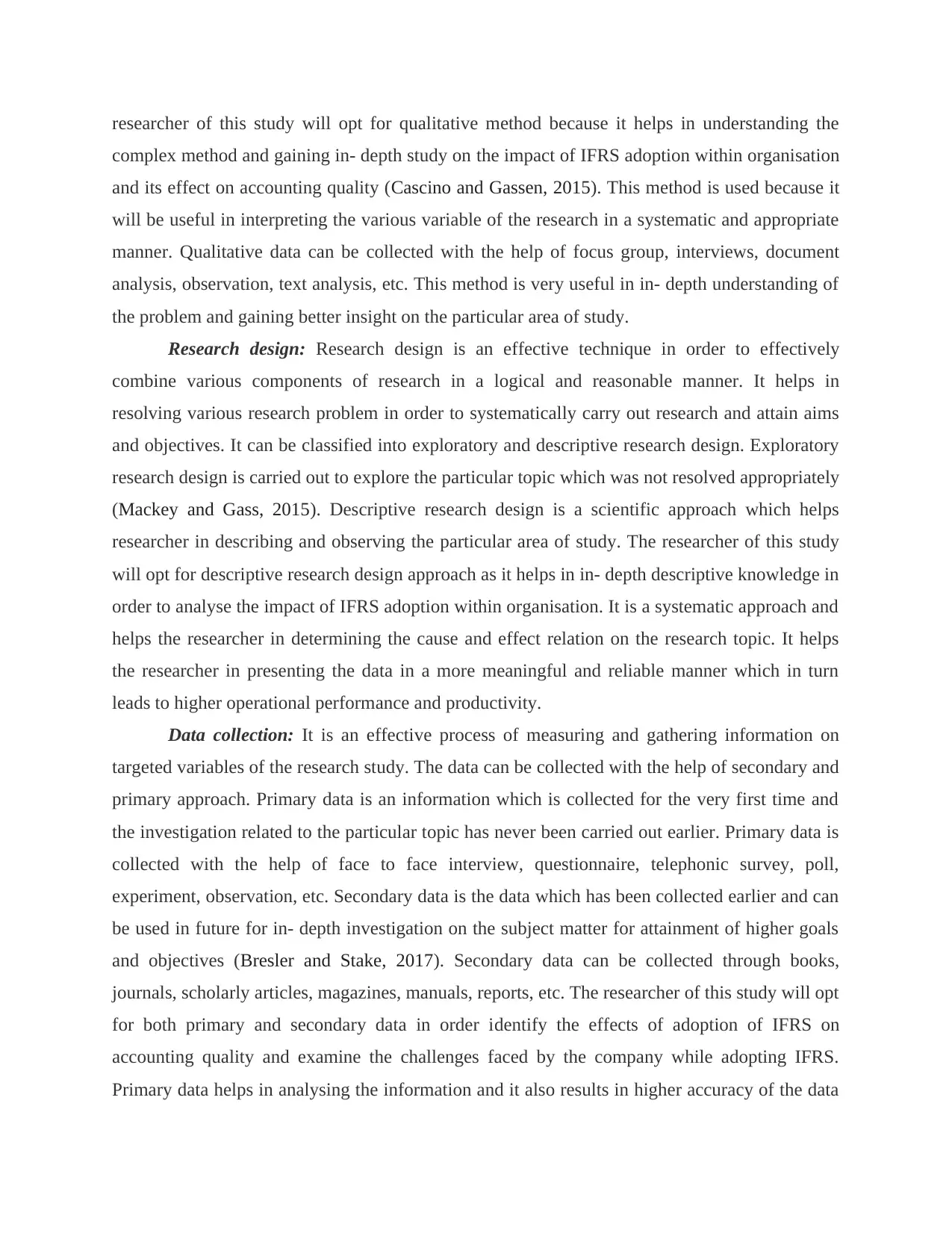
researcher of this study will opt for qualitative method because it helps in understanding the
complex method and gaining in- depth study on the impact of IFRS adoption within organisation
and its effect on accounting quality (Cascino and Gassen, 2015). This method is used because it
will be useful in interpreting the various variable of the research in a systematic and appropriate
manner. Qualitative data can be collected with the help of focus group, interviews, document
analysis, observation, text analysis, etc. This method is very useful in in- depth understanding of
the problem and gaining better insight on the particular area of study.
Research design: Research design is an effective technique in order to effectively
combine various components of research in a logical and reasonable manner. It helps in
resolving various research problem in order to systematically carry out research and attain aims
and objectives. It can be classified into exploratory and descriptive research design. Exploratory
research design is carried out to explore the particular topic which was not resolved appropriately
(Mackey and Gass, 2015). Descriptive research design is a scientific approach which helps
researcher in describing and observing the particular area of study. The researcher of this study
will opt for descriptive research design approach as it helps in in- depth descriptive knowledge in
order to analyse the impact of IFRS adoption within organisation. It is a systematic approach and
helps the researcher in determining the cause and effect relation on the research topic. It helps
the researcher in presenting the data in a more meaningful and reliable manner which in turn
leads to higher operational performance and productivity.
Data collection: It is an effective process of measuring and gathering information on
targeted variables of the research study. The data can be collected with the help of secondary and
primary approach. Primary data is an information which is collected for the very first time and
the investigation related to the particular topic has never been carried out earlier. Primary data is
collected with the help of face to face interview, questionnaire, telephonic survey, poll,
experiment, observation, etc. Secondary data is the data which has been collected earlier and can
be used in future for in- depth investigation on the subject matter for attainment of higher goals
and objectives (Bresler and Stake, 2017). Secondary data can be collected through books,
journals, scholarly articles, magazines, manuals, reports, etc. The researcher of this study will opt
for both primary and secondary data in order identify the effects of adoption of IFRS on
accounting quality and examine the challenges faced by the company while adopting IFRS.
Primary data helps in analysing the information and it also results in higher accuracy of the data
complex method and gaining in- depth study on the impact of IFRS adoption within organisation
and its effect on accounting quality (Cascino and Gassen, 2015). This method is used because it
will be useful in interpreting the various variable of the research in a systematic and appropriate
manner. Qualitative data can be collected with the help of focus group, interviews, document
analysis, observation, text analysis, etc. This method is very useful in in- depth understanding of
the problem and gaining better insight on the particular area of study.
Research design: Research design is an effective technique in order to effectively
combine various components of research in a logical and reasonable manner. It helps in
resolving various research problem in order to systematically carry out research and attain aims
and objectives. It can be classified into exploratory and descriptive research design. Exploratory
research design is carried out to explore the particular topic which was not resolved appropriately
(Mackey and Gass, 2015). Descriptive research design is a scientific approach which helps
researcher in describing and observing the particular area of study. The researcher of this study
will opt for descriptive research design approach as it helps in in- depth descriptive knowledge in
order to analyse the impact of IFRS adoption within organisation. It is a systematic approach and
helps the researcher in determining the cause and effect relation on the research topic. It helps
the researcher in presenting the data in a more meaningful and reliable manner which in turn
leads to higher operational performance and productivity.
Data collection: It is an effective process of measuring and gathering information on
targeted variables of the research study. The data can be collected with the help of secondary and
primary approach. Primary data is an information which is collected for the very first time and
the investigation related to the particular topic has never been carried out earlier. Primary data is
collected with the help of face to face interview, questionnaire, telephonic survey, poll,
experiment, observation, etc. Secondary data is the data which has been collected earlier and can
be used in future for in- depth investigation on the subject matter for attainment of higher goals
and objectives (Bresler and Stake, 2017). Secondary data can be collected through books,
journals, scholarly articles, magazines, manuals, reports, etc. The researcher of this study will opt
for both primary and secondary data in order identify the effects of adoption of IFRS on
accounting quality and examine the challenges faced by the company while adopting IFRS.
Primary data helps in analysing the information and it also results in higher accuracy of the data
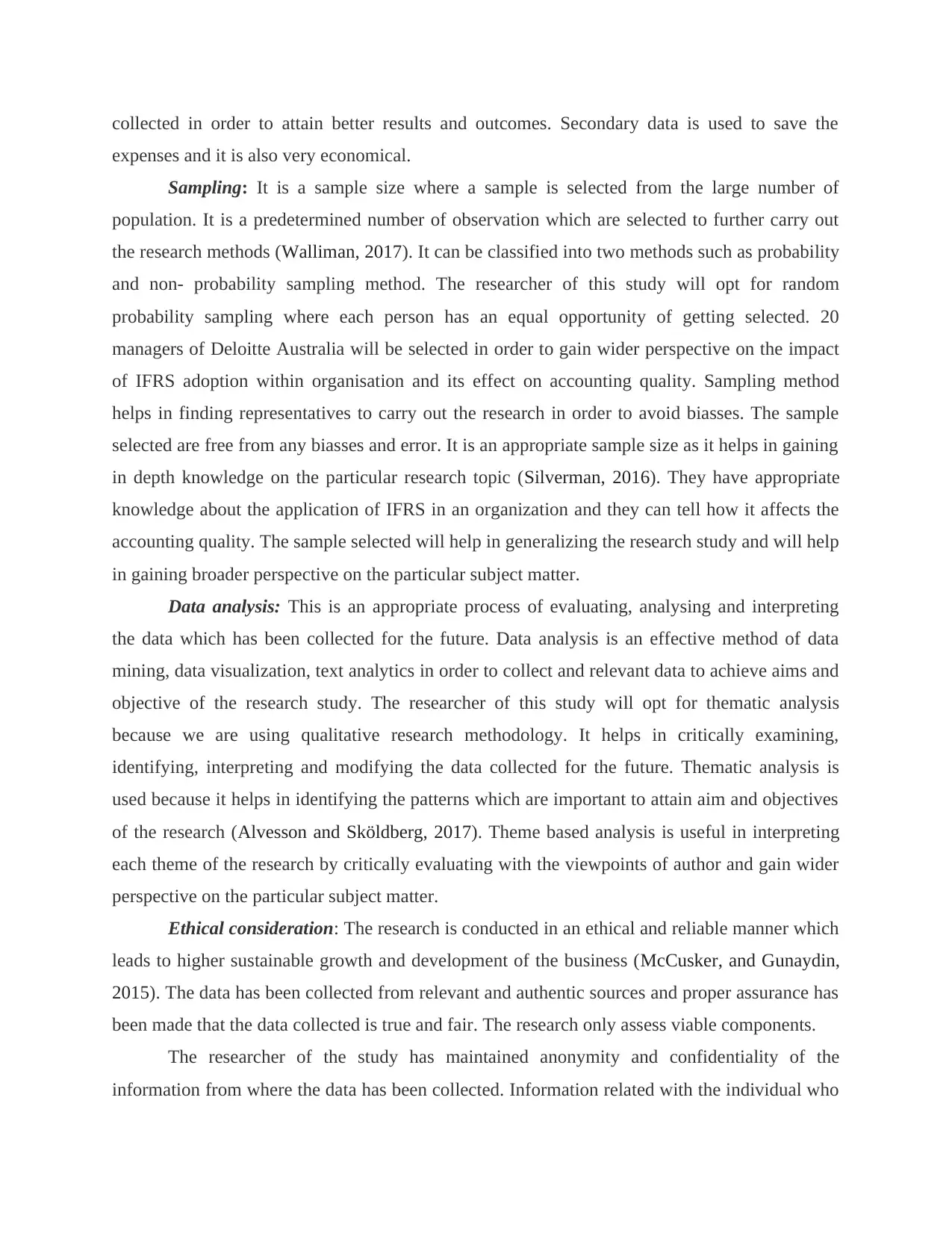
collected in order to attain better results and outcomes. Secondary data is used to save the
expenses and it is also very economical.
Sampling: It is a sample size where a sample is selected from the large number of
population. It is a predetermined number of observation which are selected to further carry out
the research methods (Walliman, 2017). It can be classified into two methods such as probability
and non- probability sampling method. The researcher of this study will opt for random
probability sampling where each person has an equal opportunity of getting selected. 20
managers of Deloitte Australia will be selected in order to gain wider perspective on the impact
of IFRS adoption within organisation and its effect on accounting quality. Sampling method
helps in finding representatives to carry out the research in order to avoid biasses. The sample
selected are free from any biasses and error. It is an appropriate sample size as it helps in gaining
in depth knowledge on the particular research topic (Silverman, 2016). They have appropriate
knowledge about the application of IFRS in an organization and they can tell how it affects the
accounting quality. The sample selected will help in generalizing the research study and will help
in gaining broader perspective on the particular subject matter.
Data analysis: This is an appropriate process of evaluating, analysing and interpreting
the data which has been collected for the future. Data analysis is an effective method of data
mining, data visualization, text analytics in order to collect and relevant data to achieve aims and
objective of the research study. The researcher of this study will opt for thematic analysis
because we are using qualitative research methodology. It helps in critically examining,
identifying, interpreting and modifying the data collected for the future. Thematic analysis is
used because it helps in identifying the patterns which are important to attain aim and objectives
of the research (Alvesson and Sköldberg, 2017). Theme based analysis is useful in interpreting
each theme of the research by critically evaluating with the viewpoints of author and gain wider
perspective on the particular subject matter.
Ethical consideration: The research is conducted in an ethical and reliable manner which
leads to higher sustainable growth and development of the business (McCusker, and Gunaydin,
2015). The data has been collected from relevant and authentic sources and proper assurance has
been made that the data collected is true and fair. The research only assess viable components.
The researcher of the study has maintained anonymity and confidentiality of the
information from where the data has been collected. Information related with the individual who
expenses and it is also very economical.
Sampling: It is a sample size where a sample is selected from the large number of
population. It is a predetermined number of observation which are selected to further carry out
the research methods (Walliman, 2017). It can be classified into two methods such as probability
and non- probability sampling method. The researcher of this study will opt for random
probability sampling where each person has an equal opportunity of getting selected. 20
managers of Deloitte Australia will be selected in order to gain wider perspective on the impact
of IFRS adoption within organisation and its effect on accounting quality. Sampling method
helps in finding representatives to carry out the research in order to avoid biasses. The sample
selected are free from any biasses and error. It is an appropriate sample size as it helps in gaining
in depth knowledge on the particular research topic (Silverman, 2016). They have appropriate
knowledge about the application of IFRS in an organization and they can tell how it affects the
accounting quality. The sample selected will help in generalizing the research study and will help
in gaining broader perspective on the particular subject matter.
Data analysis: This is an appropriate process of evaluating, analysing and interpreting
the data which has been collected for the future. Data analysis is an effective method of data
mining, data visualization, text analytics in order to collect and relevant data to achieve aims and
objective of the research study. The researcher of this study will opt for thematic analysis
because we are using qualitative research methodology. It helps in critically examining,
identifying, interpreting and modifying the data collected for the future. Thematic analysis is
used because it helps in identifying the patterns which are important to attain aim and objectives
of the research (Alvesson and Sköldberg, 2017). Theme based analysis is useful in interpreting
each theme of the research by critically evaluating with the viewpoints of author and gain wider
perspective on the particular subject matter.
Ethical consideration: The research is conducted in an ethical and reliable manner which
leads to higher sustainable growth and development of the business (McCusker, and Gunaydin,
2015). The data has been collected from relevant and authentic sources and proper assurance has
been made that the data collected is true and fair. The research only assess viable components.
The researcher of the study has maintained anonymity and confidentiality of the
information from where the data has been collected. Information related with the individual who
⊘ This is a preview!⊘
Do you want full access?
Subscribe today to unlock all pages.

Trusted by 1+ million students worldwide
1 out of 16
Related Documents
Your All-in-One AI-Powered Toolkit for Academic Success.
+13062052269
info@desklib.com
Available 24*7 on WhatsApp / Email
![[object Object]](/_next/static/media/star-bottom.7253800d.svg)
Unlock your academic potential
Copyright © 2020–2025 A2Z Services. All Rights Reserved. Developed and managed by ZUCOL.





